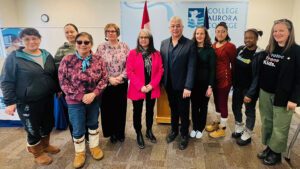Two levels of government will invest $5.3 million over five years to support personal support workers across the Northwest Territories.
NWT MP Michael McLeod stated in a release: “Personal support workers are the backbone of our health care system, especially in rural and remote areas.”
Through this agreement announced on Tuesday, the NWT will be able to support the recruitment and retention of new support workers by:
- Hiring educators in each Health and Social Services Authority to provide ongoing training and support or he workers; and
- Enhancing support worker education programs to meet labour market demands through expanding Aurora College’s Personal Support Worker Certificate course
Personal support workers provide essential care to seniors, individuals with disabilities, and vulnerable populations in the comfort of their own homes and communities.
The Aurora College website describes a career as a personal support worker to be, “mentally, physically and interpersonally challenging, so students must be physically fit and of good character.”
NWT Minister of Health and Social Services Lesa Semmler called the agreement a significant investment in the health and wellness of Northwest Territories residents.
She stated: “By enabling more training and support and enhancing education programs to meet labour demands, we are working collaboratively to improve the recruitment and retention of PSWs and provide the high-quality and culturally-sensitive care that residents of the Northwest Territories need and deserve.”
The agreement amends the year-old Aging with Dignity bilateral agreement between Ottawa and the GNWT.
Aurora College stated in a release it is now set to expand and enhance the Personal Support Worker Certificate program, as it expects to receive approximately $3.2 million of the announced funding.
Since introducing the program in 2008, 230 students have graduated from the in-person, onsite Personal Support Worker certificate program, stated the college.
In the period from 2021 to 2024, there have been 34 graduates from the distance certificate program. Students have taken advantage of the distance learning opportunity from smaller communities including: Behchokǫ̀, Délı̨nę, Fort Good Hope, Fort Resolution, Kátł’odeeche First Nation, Paulatuk, Sachs Harbour, Tuktoyaktuk, and Ulukhaktok.
Those in addition to Yellowknife and regional centres.

NWT MP Michael McLeod (dark jacket) and NWT Health and Social Services Minister Lesa Semmler (pink jacket) at an announcement on personal support worker funding in Yellowknife on Tuesday. (Photo courtesy of MP McLeod/Facebook)





